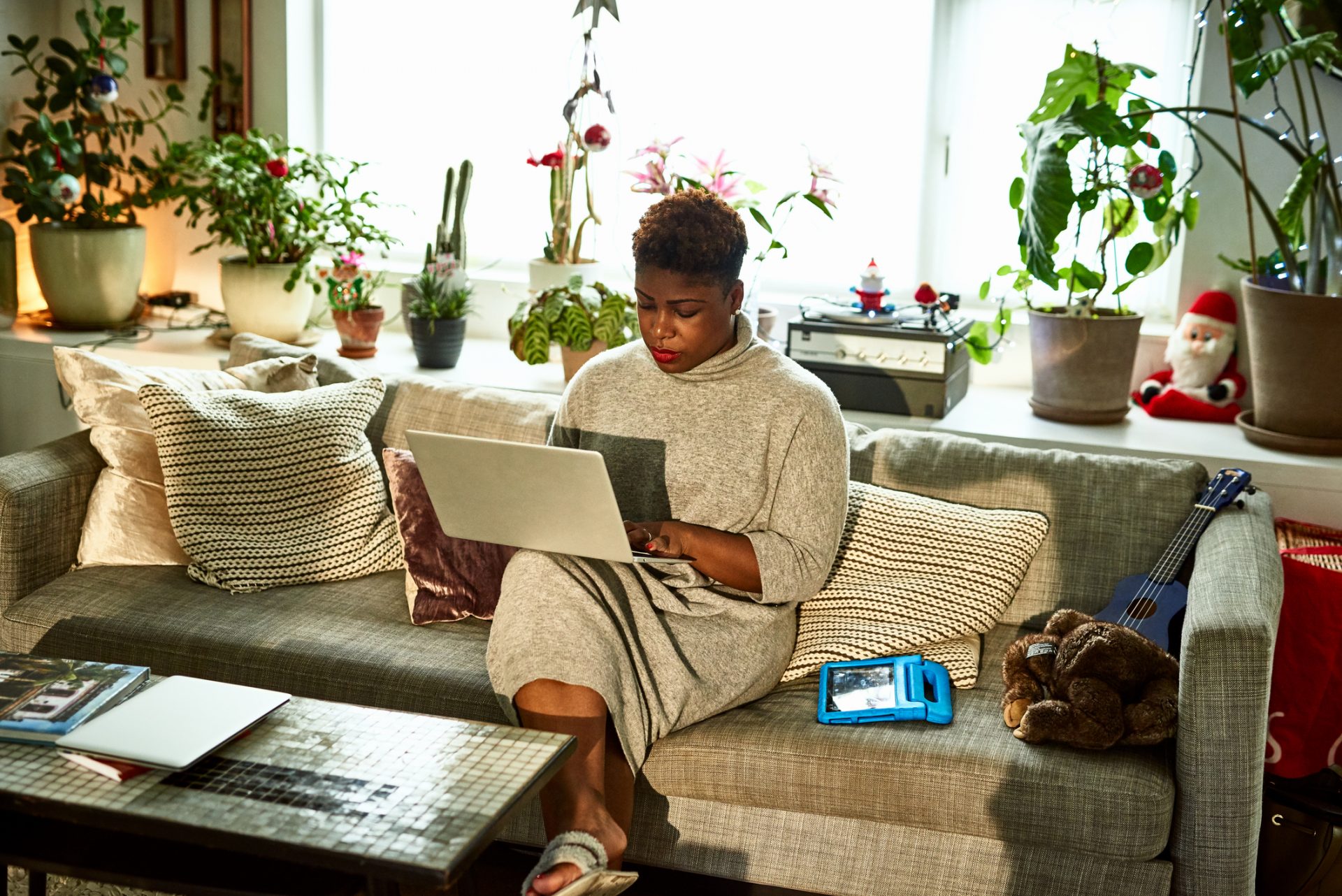There’s no doubt that the option to WFH has changed our working patterns hugely, and many of us have no intention of returning to the office full-time. But how good is hybrid working for us really? We take a look at the mental and physical health impact of kitchen table careers.
So much has changed in the last three years. Where once we were tied into commuting to the office five days a week, barely ever spending any time at home, these days, we’re much more likely to be working from the kitchen table – much to the detriment of our back health, at the very least.
There are undeniable benefits to hybrid working – a better work-life balance, being able to roll out of bed at the last minute and not be late for your Monday meeting – but has this new normal of hybrid working really been the boon we might think? A new study reveals that hybrid workers exercise more, get more sleep and eat healthier food than when they were in the office full-time, but it feels like more of us than ever are feeling burnt out and overwhelmed, never able to switch off.
With this in mind, we asked four women how hybrid working is working for them.
You may also like
Working from home and mental health: why taking annual leave is more important than ever
Toni Jones, editor and founder of The Shelf Help Club, is evangelical about the benefits of working from home. “Today I’m the healthiest – mentally, physically, spiritually – that I’ve ever been and a huge WFH (and working on ourselves) advocate,” she tells Stylist.
“I’m a full-time WFH-er living in Norfolk now, but I used to be tied to my London office desk often from 7am until 5pm. Working from home brought lots of highs and lows at first, but today, working from home allows me to balance my work-life blend in the best way.”
And for entrepreneur Sarah Berthon, a hybrid working model has quite literally saved her career, allowing her to continue to work while managing chronic illnesses. “For me, WFH and hybrid working has enabled me to keep working – it is brilliant for my health. I don’t think I’d be able to work if WFH wasn’t an option, as I would always get unwell being in an office and was constantly wiped out.
“WFH enables me to work from home without getting ill. I can get up and move around whenever I like, which with a painful back and hips is invaluable. I often lie down for 20 minutes at lunchtime, which gives me a burst of energy for the rest of the afternoon.”

Hybrid working means more time to exercise
All the women we spoke to agree that they have more time and capacity to exercise now, with lots of us using what used to be our commuting time or lunch break to work out instead.
“I work out at lunch now because I can take my laptop with me to wherever I’m going,” explains Jones, “so there’s no travel time between pool/gym and desk. I also don’t need to worry about how smart I look for the afternoon, which saves time.”
Caroline Marshall, founder of virtual assistant company Upsource, agrees. “Without a doubt, hybrid working has been a positive for my fitness. As I don’t have commute time, I can squeeze exercising into my workday, which would be impossible in the evenings and with the kids’ bedtimes.”
And the post-pandemic cliché of getting a dog has also benefitted our fitness – we’re all aware of how great walking is for our physical health, and our furry friends are making sure we get out in nature at least once a day.

We eat more healthily at home
While we’re all having to think ahead more in terms of meals (no popping to Pret every day), most of us agree that hybrid working has been good for our diets overall.
“I’m definitely saving money and eating better when I’m working from home,” says Jones. “I’m not buying lunch out everyday and as there are fewer (no!) options for grabbing lunches, I have to plan and make my own – something I never found time to do before. There’s also less temptation to nip to the pub after work – something I always found time to do before!”
Berthon agrees. “I’m eating much more healthily now. If I want a snack, I have fruit and bowls of cashews and walnuts available, plus I can make myself a healthy salad for lunch rather than relying on something packaged.”
You may also like
5 elevated toast toppings to save your WFH lunches
What about our mental health?
But it’s not all good news, as many of us have struggled more with our mental health post-pandemic than ever before – and a hybrid working model, where we’re sometimes isolated from our colleagues, isn’t helping.
“I’d go so far as to say that initially, working from home pretty much destroyed my mental health,” recalls Jones. “Things only started to improve when I found routines and boundaries and started incorporating self-care into my working life as much as I did in my non-work life.”
Missing human connection
It’s fair to say that we all miss office banter and water-cooler gossip at times. WFH can be lonely, as Sophia Procter discovered when starting her business from her kitchen table in lockdown. “I’ve found that it’s really important to be around other people, to network and not spend too much time alone. Even when you’re on Zoom calls all day, nothing quite beats face-to-face contact for your wellbeing.”
She’s now joined a co-working space, which in addition to providing much-needed human contact, has allowed her to rebuild some boundaries and switch off after a day of work.
Not taking proper breaks
It’s so easy when we’re WFH to sit for hours without even moving – and this includes when we’re not well. Being able to access the office remotely means fewer of us are taking sick days – which isn’t a good thing.
“When I first started hybrid working it definitely impacted my health negatively,” recalls Marshall. “While it was life changing in many ways, it meant that I didn’t take sick days if I was poorly – I’d just WFH and not properly rest and recover. When I got pregnant, I struggled with morning sickness and my mental health suffered. Working from home meant I was overworking and not looking after myself.”
You may also like
Mental health: 6 signs that you struggle to set boundaries at work
How to make hybrid working work for you
It’s clear from the women we spoke to that creating a healthy and fulfilling hybrid working routine takes time and effort – but it is worth it.
“Since implementing some rules for myself – such as taking regular breaks and time off when I’m not well – I have a much better balance,” says Marshall.
The consensus seems to be that yes, hybrid working can be great for our physical health, in particular – provided we look after our mental health at the same time. Good advice for life, wherever and however we’re working.
Images: Getty
Source: Read Full Article
